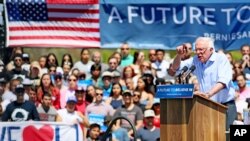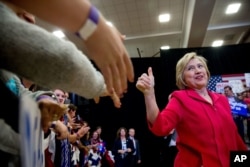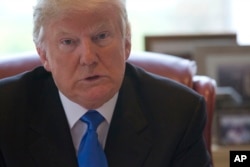With two weeks left before the last big votes in the Democratic presidential nomination process, Vermont Senator Bernie Sanders says former Secretary of State Hillary Clinton is "jumping the gun a little bit" in considering herself the party's nominee.
Sanders said during an appearance Sunday on ABC's This Week he expects to do "very well" in the nine remaining contests. He told supporters later at a rally in (the western state of) California, which has more delegates up for grabs than any other state, that a strong showing there would give him momentum going into the Democratic convention in July.
"If we win the nomination, I assure you Donald Trump will not become president," Sanders said.
Trump is already the Republican Party's presumptive nominee, having outlasted all of the other candidates in the party's nomination race. Sanders called attention to the latest polls that again show him defeating Trump by a bigger margin than Clinton. Those same polls put a Trump-Clinton matchup about even.
But the problem for Sanders is that in the primaries and caucuses that began in February, Clinton has amassed more delegates. Counting the hundreds of so-called super delegates who have said they will support her, Clinton leads Sanders 2,293 to 1,533. Unless Sanders can swing most of the super delegates his way, he would have to win about 90 percent of the remaining delegates at stake to have a chance.
So it is that voters in the United States appear to be heading to polls in November with a choice between Clinton and Trump, the candidates of the country's two major parties. They are also, according to new polls, two candidates who are not well liked.
A Washington Post/ABC News poll showed 53 percent of respondents had an unfavorable view of Clinton compared to 60 percent for Trump. Conversely, Sanders had a 51 percent favorable rating.
Sanders has for several months resisted calls for him to drop out of the race, saying he will remain until the final votes have been cast. Clinton has not openly opposed his decision, but at the same time has increasingly turned her attention to Trump.
"I think that Senator Sanders has every right to finish off his campaign however he chooses," Clinton said Sunday on NBC's Meet The Press. "I do think there will then be the obvious need for us to unify the party. I faced the same challenge in 2008. I will certainly do my part, reaching out to Senator Sanders, reaching out to his supporters, and I expect him to do his."
Clinton lost the 2008 Democratic nomination to now-President Barack Obama after a closely contested race. Trump said Sunday on Twitter than Sanders is "continuing his quest because he believes that crooked Hillary Clinton will be forced out of the race" because of her controversial use of a personal email system while secretary of state.
The Washington Post-ABC News poll asked if those leaning toward Republicans and Democrats were confident their party would unite behind Trump and Clinton, respectively, after the primary fights. Seventy-eight percent of Republicans and 88 percent of Democrats said yes.
Another poll, from MSNBC and The Wall Street Journal, put Clinton ahead among African Americans, Latinos, women and people between the ages of 18 and 34. Trump led among whites, older voters, men and independents.
Both polls showed more than 40 percent of people would consider voting for a third party candidate. That was similar to a 2012 Washington Post/ABC News poll that asked more specifically if people would vote for a third party candidate who agreed with them on most issues. The answer back then was 22 percent definitely would and 46 percent would consider it.
The results for the 2016 election will not be known for six months, but 2012 apparently did not feature the right kind of third party candidate for those voters. According to data from the Federal Election Commission, 26 third party candidates appeared on the presidential ballot in at least one of the 50 states. Collectively they received 1.6 percent of the vote.
Libertarian candidate Gary Johnson did the best, earning nearly 1 percent of the vote to come in third behind Obama and Republican candidate Mitt Romney. The Libertarians are holding their convention beginning Friday with Johnson among their candidates again this election.
The most recent poll by Fox News included Johnson in a potential matchup with Trump and Clinton. Trump came out ahead with 42 percent followed by Clinton at 39 percent and Johnson at 10 percent. Johnson appeared to take votes equally from both.
Johnson's running mate, former Massachusetts Governor Bill Weld, said Sunday on CNN's State of the Union the Libertarians want to push both of the major parties on their policy positions.
"I'd like to ideally nudge the Democrats toward the economic center, get them away from excessive spending," Weld said. "I would like to get the Republicans to get away from their anti-abortion stance, their queasiness with gays and lesbians being able to live openly and married and peaceably."
He said the Johnson campaign has not had conversations with Romney or other Republicans who oppose Trump and have discussed potentially supporting a third party candidate.
"I want to make sure we've got the building blocks of a national campaign all set up before we go around asking others for help," Weld said. "I think a little bit of fundraising would probably be the first order of business to make sure we could staff this out."






